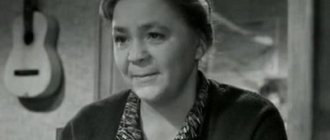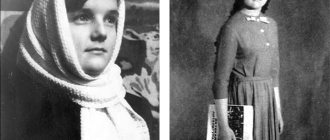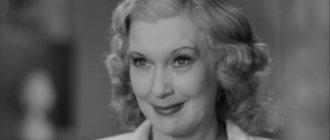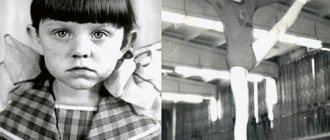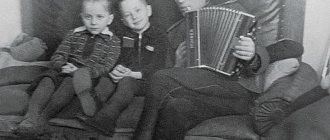Childhood and adolescence
The parents of the future singer met in Transbaikalia, where their father, military railway worker Vasily Andreevich Tolkunov, was sent to serve. There he met his future wife, Evgenia Nikolaevna Smirnova, the daughter of a repressed enemy of the people, who worked at the railway station. The young people got married and moved together to the village of Belorechenskaya, where Vasily Andreevich participated in the restoration of the railway communication destroyed during the war.
Valentina Tolkunova in childhood (with parents and younger brother)
In 1946, their eldest daughter Valya was born in one of the maternity hospitals in Armavir. The singer said that her mother’s contractions began in the train carriage, and the woman barely had time to get to the nearest hospital.
The young couple stayed in the Krasnodar region for a short time - when Valentina was one year and seven months old, the family moved to Moscow. We settled in Khovrino, where we first lived in a barracks for railway workers, and then moved to a separate apartment.
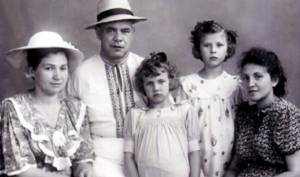
Valentina and her mother (right) with relatives in Poltava
In 1949, Valya had a brother, Sergei, who later also became a singer, Honored Artist of Russia, performed with his sister in joint concerts, and after her death led the Charitable Foundation for the Support of Contemporary Art named after her.
The family lived quite modestly, with enough money only for the bare necessities. But no expense was spared on the records - the parents loved the work of Klavdia Shulzhenko, Leonid Utesov, Pyotr Leshchenko, and the children grew up surrounded by good music. Valya knew all the songs by heart and willingly sang along with the great Russian performers with her gentle, flute-like voice. But she was embarrassed to speak in public until a commission to select votes for the children’s choir of the Central House of Railwaymen came to the school where she studied.
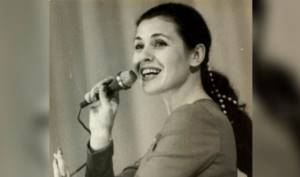
Singer Valentina Tolkunova
She was immediately offered to become a member of the team, which was headed by Semyon Osipovich Dunaevsky, brother of the famous composer Isaac Dunaevsky. And Valentina’s first teacher was Tatyana Nikolaevna Ovchinnikova, who “cut” Tolkunova’s voice.
The children's choir under the direction of Dunaevsky performed in the Kremlin Palace of Congresses, the Hall of Columns of the House of Unions, and recorded with the best symphony orchestras of the country. Among them was an orchestra conducted by Yuri Saulsky, a man who played a significant role in Valentina’s life.
By the end of school, Tolkunova had firmly decided to connect her future life with creativity and in 1964 she became a student in the conducting and choral department of the Moscow Institute of Culture. Then she transferred to the Gnessin School, from which she graduated with honors.
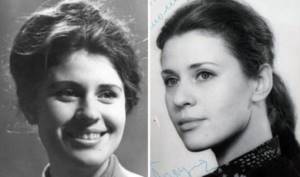
Valentina Tolkunova in her youth
At the age of 19, by the will of fate, she met Saulsky again - the master was looking for a soloist in the new vocal and instrumental orchestra “VIO-66” and remembered Valentina, because as a girl she amazed him with her unusual clear and high soprano. For Tolkunova, who was accustomed to performing lyrical songs and romances, the orchestra’s jazz repertoire came as a complete surprise. But she was so flattered by the high trust of the venerable composer that she accepted his offer without hesitation and enthusiastically began to master a new musical genre for herself.
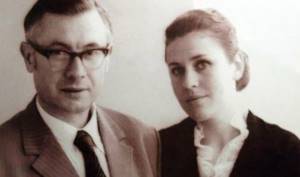
Yuri Saulsky and Valentina Tolkunova
Working together brought the eminent musician and the young singer so close that they soon became husband and wife. Like Pygmalion, Saulsky sculpted a real pop diva from a modest beginning vocalist, who, even after their separation, did not get lost among many competitors, but continued to move her way.
Memory of the singer
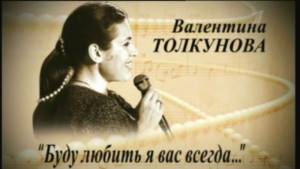
The singer did not leave an autobiography, and her fans are forced to look for information about the work and fate of Valentina Tolkunova on their own on the Internet, in old newspaper and magazine publications preserved in libraries. This task can be made a little easier by the fictional television series “She Couldn’t Do Otherwise,” released in 2013, based on the biography of the Soviet pop star. The main role in it - singer Alevtina Tolkacheva - was played by actress Olga Fadeeva. In the same year, the premiere of the documentary film about Valentina Tolkunova “I Will Always Love You” took place.
In the city of the singer’s birth, Armavir, a museum named after her has been opened.
Since 1914, the musical song festival named after V. Tolkunova “Soul of Russia” began to be held in Moscow.
Valentina Vasilyevna Tolkunova is one of those pop artists whose work on the musical stage marks an entire era. Having become a real star during her lifetime, she remains one to this day.
Creative path
For five years, from 1966 to 1971, Valentina sang the jazz repertoire. After leaving VIO-66, she took on any job - participated in group concerts and musical performances, recorded songs for cinema, acted in episodic roles and participated in dubbing films.
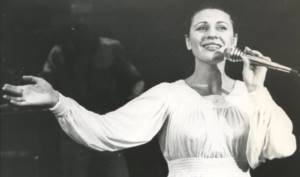
Valentina Tolkunova in her youth
The singer’s calling card was the song “I’m Standing at a Stop,” written by composer Ilya Kataev for the multi-part film “Day by Day.” The song premiered in 1971. Nina Sazonova sang it in the film, and two years later Kataev offered it to Tolkunova. She first performed with it in Kataev’s author’s concert, and then at the television competition “Artloto”, where she took first place. Performed by Tolkunova, the song received a second wind and soon became fused with the singer’s name. “So Nina and I divided the success in half,” Valentina later joked. Valentina Tolkunova - Standing at a stop In 1972, at the anniversary evening of songwriter Lev Oshanin, Tolkunova sang a little-known song by Vladimir Shainsky “Ah, Natasha.” The composer did not like this song and wanted to put it “on the table”, but still gave it to Valentina, and in the end it was a composition that unexpectedly created a sensation. The singer was called for an encore twice and did not want to let her leave the stage for a long time. Valentina Tolkunova - Ah, Natasha (1982) It was at this concert that the singer first wove a string of pearls into her luxurious long hair. Considering this decoration a lucky talisman, Tolkunova has since practically not changed her image, which has become her signature style for many years.
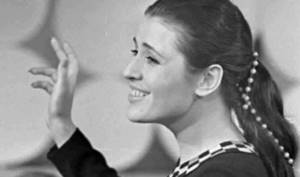
The string of pearls in her hair has become an integral attribute of the singer
This performance opened the way for Tolkunova to radio and television. Her songs began to sound on the air, records began to be released one after another, and the singer began to be invited to all-Union music festivals and competitions.
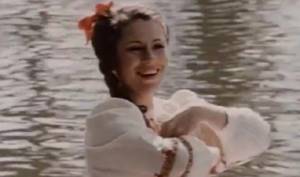
Still from the film “I Believe in Rainbows” (1986)
Since 1973, she has been a regular participant in “Song of the Year,” “Morning Mail,” “Blue Light” and other popular television programs. The editors of these programs received bags of letters asking them to include on air the songs “Silver Wedding”, “Lonely Accordion”, “Talk to Me, Mom”, “Snub Noses”, “I Can’t Do Otherwise”, so beloved by Soviet listeners.
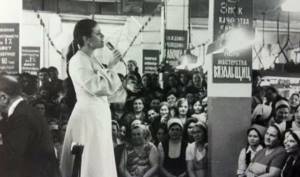
Valentina became the main star of the Soviet Union
The young vocalist was bombarded with collaboration offers from composers who previously seemed unattainable to her. Songs for Tolkunova were written by Pavel Aedonitsky, Eduard Kolmanovsky, Oscar Feltsman, Mikael Tariverdiev, David Ashkenazi, Vladislav Uspensky, Alexandra Pakhmutova and other masters of the Soviet stage. Valentina Tolkunova - I cannot do otherwise. A gentle voice combined with a sincere and sincere manner of performance could not leave the audience indifferent. The singer loved to go down from the stage into the hall and smoothly, slowly, walk between the rows - as they would say now, breaking the fourth wall. At such moments, the audience got the impression that she was addressing everyone personally, and this created, even in large halls, a special atmosphere of warmth, comfort and intimacy.
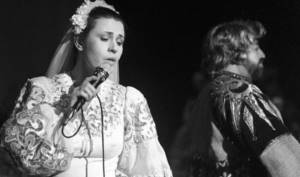
Valentina's concerts were cozy and intimate
And after the singer recorded the songs “Tired Toys Are Sleeping” for the legendary children’s program “Good Night, Kids” and “If There Were No Winter” for the cartoon “Winter in Prostokvashino”, her voice was recognized and loved not only by adults, but also by children . Valentina Tolkunova - Tired toys sleep Tolkunova supported Soviet athletes at the Olympic Games, performed for internationalist soldiers in Afghanistan, and was a regular participant in national concerts dedicated to Victory Day. A cycle of songs dedicated to the Great Patriotic War appeared in her repertoire, among which the composition “If there had been no war,” which was included in the top ten best post-war songs on this topic, stood out. Valentina Tolkunova - If there had been no war The singer toured a lot abroad, performed in Germany, Finland, Greece, Luxembourg, Vietnam, Singapore, Israel, India and Japan, and in 1985, with Igor Krutoy and the Elegy ensemble, she toured all over North America. True, after the collapse of the USSR, their paths diverged - Krutoy considered that the singer did not fit into the new rules of show business and advised her to change her repertoire and image, to which Tolkunova responded with a categorical refusal. But Igor Yakovlevich was mistaken - indeed, having become “unformatted” and disappearing from TV screens, the singer did not lose her fans and even in the difficult years for the country in the 90s, she collected full houses.
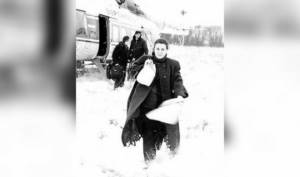
Valentina traveled to the most remote parts of the country
In 1989, Tolkunova organized the Theater of Musical Drama and Song “ART” on the basis of Mosconcert, which staged musical performances, creative programs and themed evenings. At this time, she increasingly began to turn to spiritual lyrics - confessional songs appeared in the artist’s repertoire, filled with deep philosophical meaning and revealing the depth of the female soul. For the album and concert program “My Invented Man” based on the poems of Vasily Popov, Tolkunova was awarded a prize from the international charitable foundation “Russian Culture”.
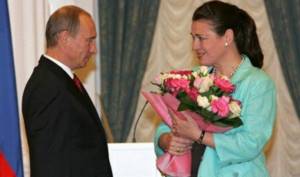
Valentina Tolkunova and Vladimir Putin (2007)
Personal life of Valentina Tolkunova
Tolkunova enjoyed success with men from school, but was brought up with strict rules and took relationships very seriously. Her first husband was composer and conductor Yuri Saulsky, almost twenty years older. They lived together for four years, until Yuri became interested in the actress of the Soviet Army Theater Valentina Aslanova.
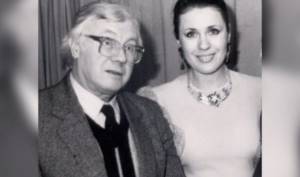
With Yuri Saulsky
Having learned about her husband’s betrayal, Valentina did not start scandals, but silently packed her things and left for the dacha, giving Saulsky the right to make the final decision himself. When she returned, she found an empty apartment, which, to give Yuri Sergeevich his due, he left to his ex-wife. Tolkunova experienced this breakup for a long time, although she managed to remain on friendly terms with the composer.
Five years after breaking up with Saulsky, Valentina met the writer and international journalist Yuri Paporov. The first meeting took place under rather amusing circumstances - Tolkunova was performing at the Mexican embassy, and Paporov was trying to translate tests of her songs. This was quite a difficult task - try to explain to a foreigner what a “half-shaloch”, “half-station” or “snub-noses” are. After the concert, the singer and the translator laughed at this situation for a long time, then they met several more times and did not even notice how carried away they were by each other.
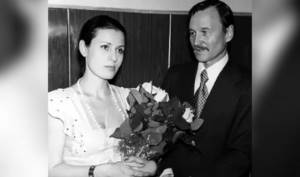
Valentina Tolkunova and Yuri Paporov
Valentina, who recently celebrated her 30th birthday, desperately dreamed of a strong family and a child. Paporov seemed like the ideal man to her, and she married him. A year later, in 1977, the couple had a son, Nikolai, and it seemed that nothing could interfere with their family idyll.
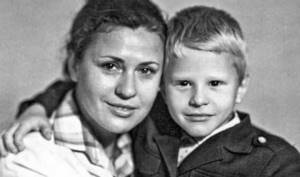
Valentina Tolkunova with her son Nikolai
But then Yuri was offered to go to Mexico to write a book there about the last period of Leon Trotsky’s life, and this trip unexpectedly dragged on for many years. Valentina and her son remained in Moscow - the singer was too in demand to sacrifice her successful career for her husband. So she lived for more than ten years as a straw widow, brightening up her loneliness in the arms of another man.
In the late 80s, Tolkunova had an affair with the director of the Kurchatov Institute, nuclear physicist Vladimir Baranov. It continued until Baranov’s death (in 2005, the scientist died from the consequences of radioactive exposure received during the liquidation of the accident at the Chernobyl nuclear power plant).
At this time, Paporov had already returned to Russia, but lived separately, as he had become a complete stranger to the singer. She never officially divorced him, fearing that this information would leak to the press and attract unwanted attention to her person. Yuri died a month and a half after the death of his wife and was buried next to her at the Troekurovsky cemetery.
Valentina Tolkunova. The Straw Widow Another pain for the singer was her grown-up son Kolya. Due to her constant busyness, Tolkunova could not give the boy due attention, and she compensated for her absence in his life with expensive gifts. Kolya was used to not denying himself anything; in his teens he got involved with bad company and became addicted to drugs. His mother managed to get him out of this addiction, but they did not become closer.
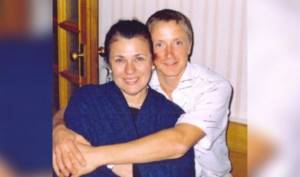
The son caused Valentina a lot of pain
The young man studied at the Law Academy, worked for some time as a lighting designer at the Valentina Tolkunova Theater of Musical Drama and Song, then went to Bulgaria, where he tried to start a construction business with his parents’ money. After the death of Valentina Vasilievna, he sold off part of her property, which the singer earned with sweat and blood, already being seriously ill. Now Nikolai Paporov lives carefree in his mother’s spacious apartment on Malaya Bronnaya, renting out part of the property that remains at his disposal.
Personal life
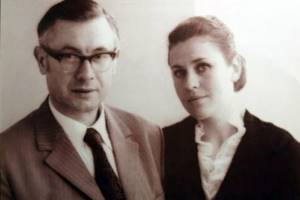
The singer was married twice. Her first husband was composer Yuri Saulsky, head of VIO-66, the family existed for six years. The marriage broke up due to an eighteen-year age difference: at the beginning of the relationship, Valentina was 19, and Yuri was 37 years old.
The young woman got married for the second time four years after her divorce from her first husband. The singer’s second choice was international journalist Yuri Paporov. But this marriage also turned out to be not very happy for the artist. Her husband’s long business trips abroad and Valentina’s own concert tours did not contribute to family life, although the artist lived with Paporov until the end of her life.
In her second marriage, the singer became the mother of her son Nikolai, her only child, whose birth date was September 10, 1977. The personal life and biography of Valentina Tolkunova’s son was also associated with art for some time - he worked at the Moscow Song and Drama Theater as a lighting designer.
Last years and death
In the 2000s, the singer began to appear on stage less and less often - a terrible illness, which Valentina Vasilyevna was diagnosed with back in 1990, made itself felt.
Tolkunova had a mastectomy and had one breast removed, followed by several courses of chemotherapy and a long rehabilitation. For a while, the disease subsided, but a few years later metastases were discovered in the singer’s lungs, and she again had to go under the surgeon’s knife. Valentina Vasilievna bravely endured all the suffering - religion, which she came to in the mid-90s, helped her survive difficult moments.
At this time, everything that had previously seemed unshakable was collapsing - the huge country in which Valentina was born and established herself as a singer fell apart into many parts and plunged into poverty and chaos. At this difficult hour, Valentina Vasilievna met the rector of the Church of the Lesser Ascension, Archpriest Gennady Ogryzkov, who became her confessor.
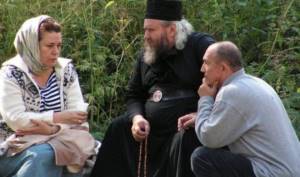
In the last years of her life, Tolkunova turned to faith
Since then, prayer books and holy scriptures have become Tolkunova’s constant companions - from them she drew strength and courage to overcome the difficult trials sent to her by fate. She made regular pilgrimages to holy places, participated in religious rites and celebrations, and donated money to monasteries and temples. Valentina Vasilievna even bought herself a house in the village of Diveevo, Nizhny Novgorod region, where she stayed when she came to venerate the relics of Seraphim of Sarov.
With the assistance of the singer, in 2009, a cross was installed on a church in the village of Lipovka, Lipetsk region, and parishioners still remember the impromptu concert that Tolkunova organized in honor of this event. And a year later the artist died - this time the metastases penetrated the brain, and the doctors were already powerless to save her.
On February 16, 2010, during a concert in Mogilev, Tolkunova became ill right on stage. Unconscious, she was hospitalized: first to a local hospital, then to Moscow. The results were disappointing - the tumor was too large, and the operation could harm the vital functions of the body.
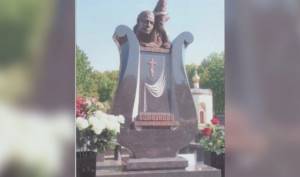
Valentina Tolkunova's grave at Troekurovskoye Cemetery
On March 20, Valentina Vasilievna invited Archpriest Artemy Vladimirov, and he performed the rite of unction right in the hospital ward. On March 22, the singer fell into a coma and died two hours later. On March 24, after a farewell at the Variety Theater and a funeral service at the Malovoznesensky Church, Tolkunova was buried at the Troekurovsky cemetery.
Death of the singer
Valentina Tolkunova's last concert took place in Mogilev.
She walked onto the stage with difficulty, and in the middle of the performance she suddenly felt suddenly dizzy, everything swam before her eyes. The director arrived in time and took her backstage. But she firmly said: “I want to finish singing” - and went on stage. Tolkunova confused words, skipped entire lines, but did not lose the melody. The audience, understanding the singer’s condition, gave her a standing ovation. After the concert, Valentina was taken to intensive care. Before his death in the hospital ward, Archpriest Artemy Vladimirov performed unction.
When the priest performed the unction, Valentina Vasilyevna said: “I felt so warm in my chest...”
The singer died a month later on March 22, 2010. She was only 63 years old at that time. The cause of death was cancer.
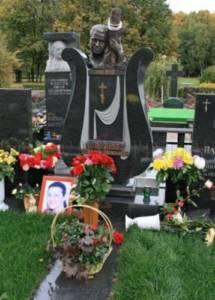
Interesting Facts
- Unlike most of her colleagues, Tolkunova was indifferent to jewelry and preferred only a string of pearls in her hair, which became part of her signature look. The singer preferred to invest money in real estate and willingly accepted gifts in the form of apartments and land.
- Valentina Vasilyevna drove a car well and changed seven Zhiguli cars until she switched to the Korean SUV KIA Sportage. The last car is Mitsubishi Outlander.
- Tolkunova never had a short haircut and was very worried when she began to lose her luxurious hair due to chemotherapy.
- The singer has never resorted to the services of plastic surgeons, believing that such radical experiments on her appearance could lead to negative consequences in the future.
- Valentina never performed at paid corporate events in front of a crowd, even in the 90s, when she was especially in need of money. Only once did she agree to perform at the Golden Palace casino in the company of Valentin Gaft, however, that time there was a truly sophisticated audience there, capable of appreciating high art.
Important dates
- 1979
– title of Honored Artist of the RSFSR - 1980
– awarded the Lenin Komsomol Prize for high performing skills and popularization of Soviet song - 1987
– title of People's Artist of the RSFSR - 1996
- awarded the Order of Friendship for services to the state and many years of conscientious work for the benefit of the Motherland - 1997
– from the hands of Vladimir Putin she received a letter of gratitude for her personal contribution to charitable activities in the field of children's charity - 2006
– awarded the Order of Honor for services to the development of domestic pop art - March 22, 2010
– date of death. Died due to a brain tumor
